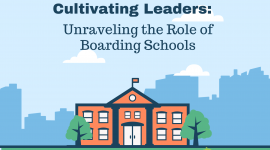Boarding schools can significantly impact the mental health of students, presenting a complex interplay of challenges and opportunities. The separation from family and home environment, a hallmark of boarding schools, can trigger feelings of homesickness, loneliness, and adjustment difficulties.
The Effects of Boarding School on the Mental Health of Students

The structured routine and academic demands may lead to stress and anxiety, as students navigate rigorous academic expectations and the pressure to excel. On the flip side, the communal living fosters a unique sense of camaraderie and lifelong friendships, providing a supportive network.
However, the competitive atmosphere can also contribute to a sense of inadequacy or heightened perfectionism. Moreover, the limited privacy and constant exposure to peer dynamics can influence self-esteem and social relationships.
Maintaining good mental health of students is paramount for overall well-being and quality of life. It is the foundation upon which we build resilience, cope with stress, and engage meaningfully with the world around us. Mental health of students is not just the absence of mental illnesses; rather, it encompasses emotional stability, psychological flexibility, and the ability to navigate life’s challenges with a positive outlook.
Investing in mental health of students fosters improved relationships, enhances productivity, and contributes to a more vibrant and fulfilling existence. Just as we prioritize our physical health through exercise and proper nutrition, tending to our mental health requires attention and care. The stigma surrounding mental health is gradually diminishing, encouraging open conversations and promoting a supportive environment for those facing challenges.
Recognizing the importance of mental health of students is a crucial step toward creating a society that values holistic well-being and embraces the diversity of human experiences.
The student community in boarding schools forms a unique and tightly-knit social fabric, characterized by a rich tapestry of diverse backgrounds and experiences. Living away from home fosters a sense of camaraderie among students as they navigate the challenges of academics, personal growth, and social dynamics together. This close proximity creates lasting bonds, as students forge friendships that often extend beyond the confines of the school years.
The shared daily routine, from classes to meals and recreational activities, promotes a strong sense of belonging and collaboration. Moreover, the boarding school environment encourages a holistic development, with students engaging not only in rigorous academic pursuits but also in extracurricular activities that shape their character.
This communal living experience instills values of teamwork, independence, and adaptability, preparing students not just for academic success but also for the broader challenges of life. Overall, the student community in boarding schools becomes a microcosm of support, fostering an environment where lifelong connections and personal growth flourish.
The mental health of students is a multifaceted and crucial aspect of their overall well-being, with far-reaching implications for academic success and personal development.
As students navigate the challenges of education, they often grapple with a myriad of stressors, including academic pressures, social dynamics, and the quest for future career paths. The demanding nature of coursework, coupled with the constant pursuit of excellence, can contribute to heightened stress levels and, in some cases, lead to anxiety or depression.
Social interactions and peer relationships also play a pivotal role in shaping the mental health landscape of students, as they navigate the complexities of friendships, peer pressure, and a sense of belonging. Educational institutions must recognize the significance of fostering a supportive environment that prioritizes mental health of students, offering resources such as counseling services, awareness programs, and a destigmatized space for seeking help.
By addressing the mental health of students, we not only enhance their academic performance but also contribute to the development of resilient, well-rounded individuals prepared to face the challenges of the future.
Boarding schools must prioritize mental health resources, offering counseling services and fostering an environment that balances academic rigor with emotional well-being. The long-term impact on mental health of students underscores the need for a holistic approach in addressing the challenges inherent in the boarding school experience.
Boarding schools, often touted as bastions of academic excellence and character development, have long been a subject of both admiration and scrutiny. While these institutions provide a unique educational experience, it’s crucial to delve into the lesser-explored realm of their impact on mental health of students.
Transition and Separation Anxiety:

Boarding schools often mark a significant transition for students, separating them from the familiar comforts of home. This abrupt shift can trigger feelings of separation anxiety, leading to initial challenges in adapting to the new environment. Understanding and addressing this emotional turbulence is essential in fostering a healthy mental state.
Academic Pressure:

The rigorous academic environment of boarding schools is a double-edged sword. While it cultivates discipline and a strong work ethic, the relentless pursuit of excellence can become a breeding ground for stress and anxiety. Striking a balance between academic rigor and mental well-being is a delicate challenge that requires constant attention.
Social Dynamics and Peer Relationships:
![]()
Boarding schools shape a unique social landscape where students live, study, and socialize together. This close-knit community can foster deep connections, but it can also give rise to issues like peer pressure, social hierarchy, and the challenge of maintaining individuality. Navigating these social dynamics is crucial for a mental health of students.
Independence and Self-Reliance:

Boarding schools emphasize self-reliance and independence, instilling a sense of responsibility in students. While this can be empowering, it also puts pressure on individuals to cope with challenges on their own. Balancing independence with a support system is essential for preventing feelings of isolation and promoting a healthy mental health of students.
Counseling and Support Services:

Recognizing the unique mental health challenges of boarding school students, institutions must prioritize counseling and support services. Accessible mental health resources, well-trained counselors, and open communication channels contribute significantly to creating a nurturing environment that addresses students’ emotional needs.
Long-Term Impact:

Understanding the long-term impact of boarding school experiences on mental health is crucial. Research suggests that individuals who attend boarding schools may carry certain emotional and psychological traits into adulthood. Examining these long-term effects can provide insights into how to improve the overall well-being of students in such environments.
In the intricate dynamics of boarding school life, the effects on students’ mental health are multifaceted. It is imperative for educators, parents, and policymakers to recognize the challenges posed by the unique environment of boarding schools and work collaboratively to create an atmosphere that nurtures both academic excellence and mental well-being.
Striking this delicate balance will not only enhance the overall educational experience but also contribute to the holistic development of students as they embark on their journey beyond the confines of boarding school life.









